人教版(2019)必修 第一册Unit 1 Teenage life Listening and Talking 课件(共15张PPT 内嵌视频)
文档属性
| 名称 | 人教版(2019)必修 第一册Unit 1 Teenage life Listening and Talking 课件(共15张PPT 内嵌视频) | 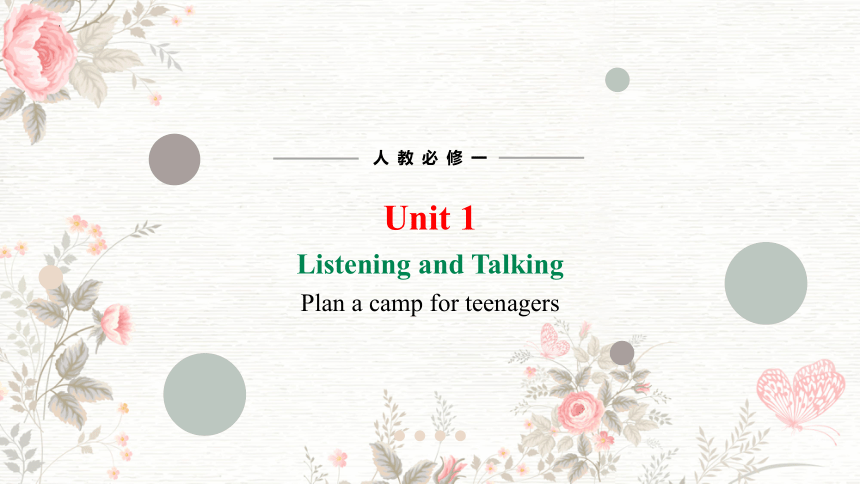 | |
| 格式 | pptx | ||
| 文件大小 | 26.8MB | ||
| 资源类型 | 教案 | ||
| 版本资源 | 人教版(2019) | ||
| 科目 | 英语 | ||
| 更新时间 | 2023-11-29 21:20:00 | ||
图片预览

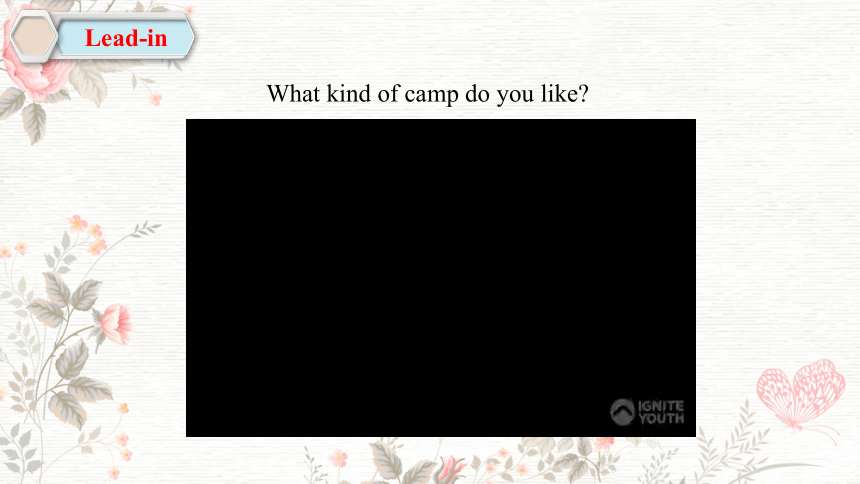
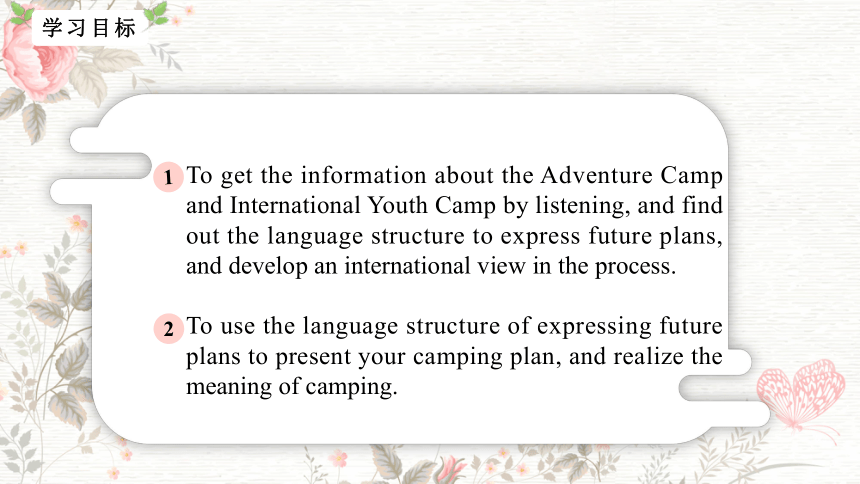

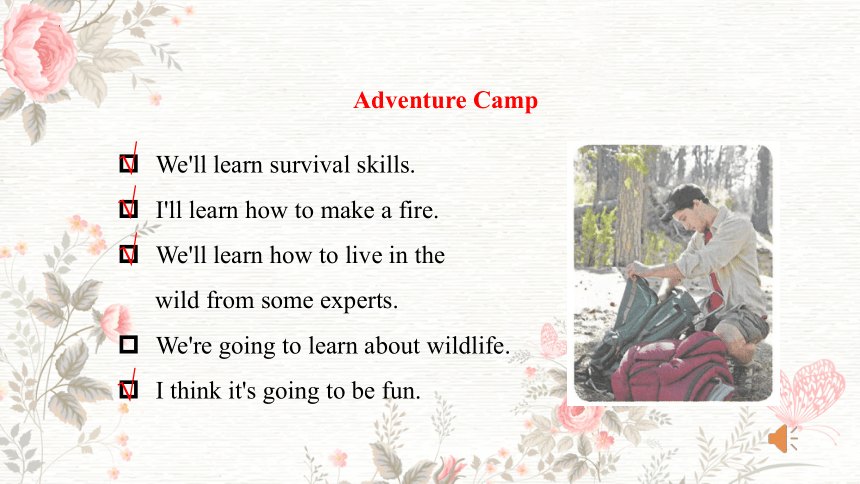
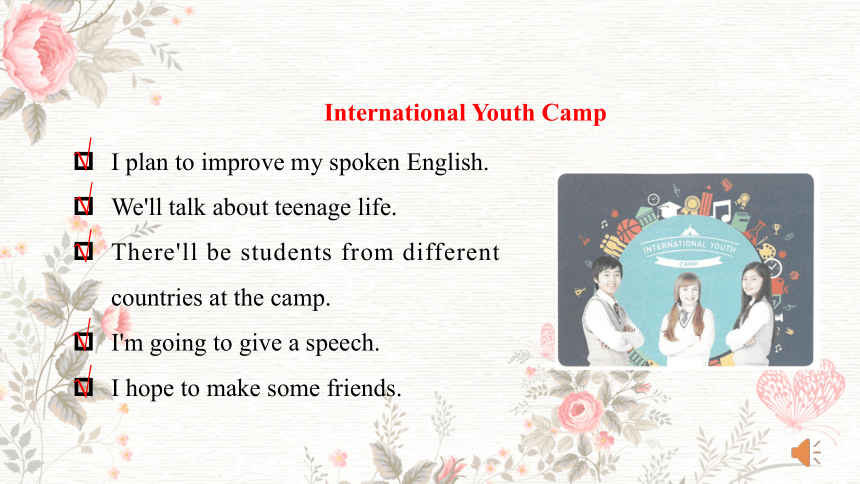
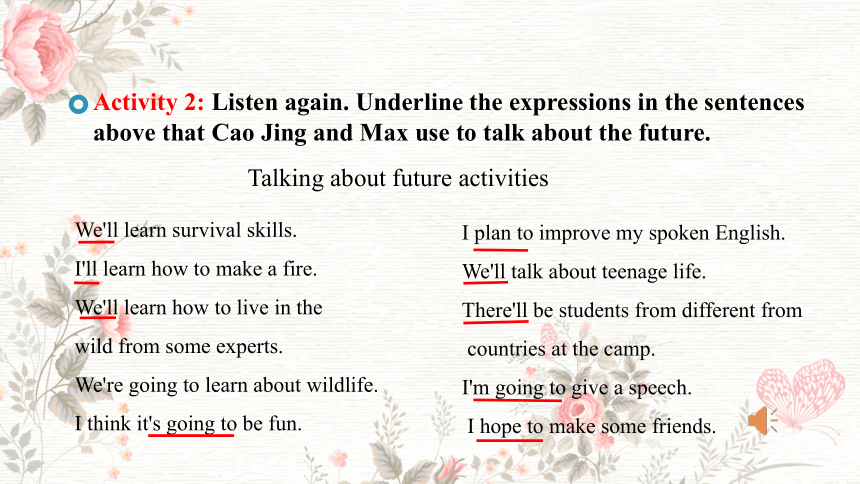
文档简介
(共15张PPT)
人教必修一
Unit 1
Listening and Talking
Plan a camp for teenagers
教学目
Lead-in
视频:Youth Camp Highlights
What kind of camp do you like
1
2
To get the information about the Adventure Camp and International Youth Camp by listening, and find out the language structure to express future plans, and develop an international view in the process.
To use the language structure of expressing future plans to present your camping plan, and realize the meaning of camping.
目标一:To get the information about the Adventure Camp and International Youth Camp by listening, and find out the language structure to express future plans, and develop an international view in the process.
Activity 1: Listen to the conversation and tick what they are going to do at the camps.
Cao Jing and Max are talking about camps.
We'll learn survival skills.
I'll learn how to make a fire.
We'll learn how to live in the
wild from some experts.
We're going to learn about wildlife.
I think it's going to be fun.
Adventure Camp
√
√
√
√
International Youth Camp
I plan to improve my spoken English.
We'll talk about teenage life.
There'll be students from different countries at the camp.
I'm going to give a speech.
I hope to make some friends.
√
√
√
√
√
Activity 2: Listen again. Underline the expressions in the sentences above that Cao Jing and Max use to talk about the future.
Talking about future activities
We'll learn survival skills.
I'll learn how to make a fire.
We'll learn how to live in the
wild from some experts.
We're going to learn about wildlife.
I think it's going to be fun.
I plan to improve my spoken English.
We'll talk about teenage life.
There'll be students from different from
countries at the camp.
I'm going to give a speech.
I hope to make some friends.
Activity 3: Look at the expressions you underlined, put them in the right chart, then discuss in your group about their use and differences.
will be going to plan / hope
We'll learn survival skills
I'll learn how to make a fire
in the wild from some experts.
We'll talk about teenage life.
There'll be students from different from countries at the camp.
I think it's going to be fun.
I’m going to give a speech.
I plan to improve my spoken English.
I hope to make some friends.
1. will
不受人的主观意愿影响的单纯将来, 一般用will;在正式的通知(如新闻媒体公布的官方消息,气象预报等)中用will。
如:Tomorrow will be April Fools’ Day.
There will be a heavy rain to the south of Huai River.
2. be going to
be going to一般表示近期,马上要发生的事情;或事先经过考虑的打算、计划、意图;或有迹象将要发生的事情。
如:It is going to rain. What are you going to do next Sunday
3.plan to
plan to一般表示很慎重、经过考虑做出的计划。
如:What are you planning to do for Christmas
4.hope to
hope to一般表示主观愿望,想做某事,并不一定能实现。
如:We hope to slow the spread of the disease.
目标二:To use the language structure of expressing future plans to present your camping plan, and realize the meaning of camping.
Activity :
Work in groups. Plan a youth camp.
1.Think of ideas for the camp. You can use the questions below to get started.
What kind of camp is it
What will they do
Who will be there
What will they learn
2.Present your ideas for a youth camp to the class.
Do you want to have fun and learn at the same time Then come to our camp. In our camp, you can learn about ... There'll be many interesting activities. First, we are going to ... Then we'll ... We also plan to ... Finally, we'll ... Please come to our camp!
Examples of camping
Focus
Discover new cities, countries and cultures.
Expose and learn new ideas in different fields of science.
Student Camp for Science
Share an incredible adventure with youngsters from
all around the world.
Student Leadership Camp
Focus
Build confidence, resilience and responsibility.
Turning students into empowered, inspiring leaders.
1.What’s the meaning of camping
2.Tell us your experience of camping.
人教必修一
Unit 1
Listening and Talking
Plan a camp for teenagers
教学目
Lead-in
视频:Youth Camp Highlights
What kind of camp do you like
1
2
To get the information about the Adventure Camp and International Youth Camp by listening, and find out the language structure to express future plans, and develop an international view in the process.
To use the language structure of expressing future plans to present your camping plan, and realize the meaning of camping.
目标一:To get the information about the Adventure Camp and International Youth Camp by listening, and find out the language structure to express future plans, and develop an international view in the process.
Activity 1: Listen to the conversation and tick what they are going to do at the camps.
Cao Jing and Max are talking about camps.
We'll learn survival skills.
I'll learn how to make a fire.
We'll learn how to live in the
wild from some experts.
We're going to learn about wildlife.
I think it's going to be fun.
Adventure Camp
√
√
√
√
International Youth Camp
I plan to improve my spoken English.
We'll talk about teenage life.
There'll be students from different countries at the camp.
I'm going to give a speech.
I hope to make some friends.
√
√
√
√
√
Activity 2: Listen again. Underline the expressions in the sentences above that Cao Jing and Max use to talk about the future.
Talking about future activities
We'll learn survival skills.
I'll learn how to make a fire.
We'll learn how to live in the
wild from some experts.
We're going to learn about wildlife.
I think it's going to be fun.
I plan to improve my spoken English.
We'll talk about teenage life.
There'll be students from different from
countries at the camp.
I'm going to give a speech.
I hope to make some friends.
Activity 3: Look at the expressions you underlined, put them in the right chart, then discuss in your group about their use and differences.
will be going to plan / hope
We'll learn survival skills
I'll learn how to make a fire
in the wild from some experts.
We'll talk about teenage life.
There'll be students from different from countries at the camp.
I think it's going to be fun.
I’m going to give a speech.
I plan to improve my spoken English.
I hope to make some friends.
1. will
不受人的主观意愿影响的单纯将来, 一般用will;在正式的通知(如新闻媒体公布的官方消息,气象预报等)中用will。
如:Tomorrow will be April Fools’ Day.
There will be a heavy rain to the south of Huai River.
2. be going to
be going to一般表示近期,马上要发生的事情;或事先经过考虑的打算、计划、意图;或有迹象将要发生的事情。
如:It is going to rain. What are you going to do next Sunday
3.plan to
plan to一般表示很慎重、经过考虑做出的计划。
如:What are you planning to do for Christmas
4.hope to
hope to一般表示主观愿望,想做某事,并不一定能实现。
如:We hope to slow the spread of the disease.
目标二:To use the language structure of expressing future plans to present your camping plan, and realize the meaning of camping.
Activity :
Work in groups. Plan a youth camp.
1.Think of ideas for the camp. You can use the questions below to get started.
What kind of camp is it
What will they do
Who will be there
What will they learn
2.Present your ideas for a youth camp to the class.
Do you want to have fun and learn at the same time Then come to our camp. In our camp, you can learn about ... There'll be many interesting activities. First, we are going to ... Then we'll ... We also plan to ... Finally, we'll ... Please come to our camp!
Examples of camping
Focus
Discover new cities, countries and cultures.
Expose and learn new ideas in different fields of science.
Student Camp for Science
Share an incredible adventure with youngsters from
all around the world.
Student Leadership Camp
Focus
Build confidence, resilience and responsibility.
Turning students into empowered, inspiring leaders.
1.What’s the meaning of camping
2.Tell us your experience of camping.
